BMP4002 Business Law: Understanding the UK Legal System and its Laws
VerifiedAdded on 2023/06/17
|11
|2684
|371
Report
AI Summary
This report provides a comprehensive analysis of the UK legal system in the context of business law. It defines laws and identifies the respective legal systems in the UK, explaining the classifications of law, including civil and criminal law, with examples. The roles of the High Court and Supreme Court are discussed, along with case law as a source of law and the process of making legislation, including delegated legislation. Furthermore, the report delves into UK employment law, covering the statutory duties of employers to their employees and the actions related to wrongful and unfair dismissal. The report concludes by emphasizing the importance of understanding and adhering to business law for effective organizational operations.
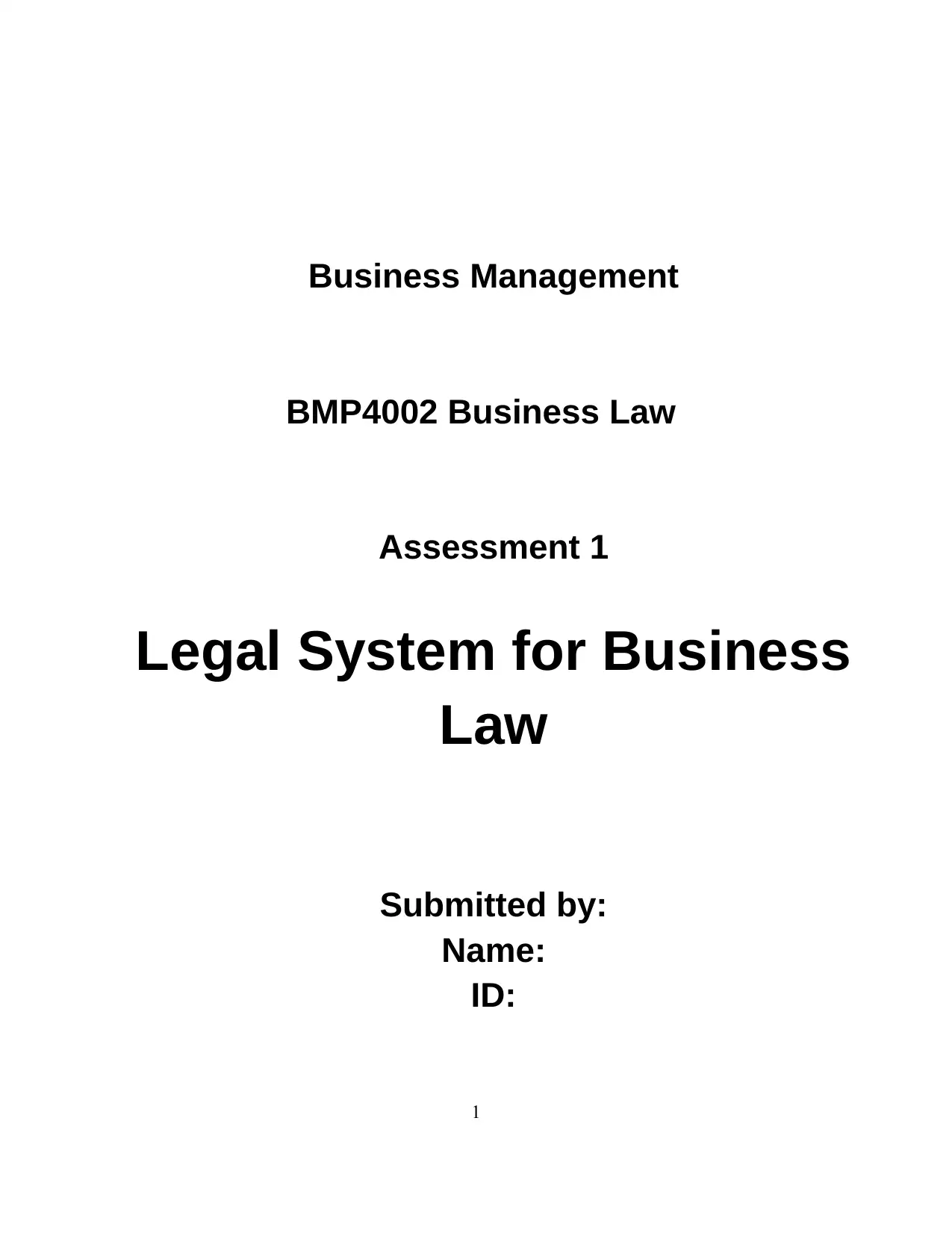
Business Management
BMP4002 Business Law
Assessment 1
Legal System for Business
Law
Submitted by:
Name:
ID:
1
BMP4002 Business Law
Assessment 1
Legal System for Business
Law
Submitted by:
Name:
ID:
1
Paraphrase This Document
Need a fresh take? Get an instant paraphrase of this document with our AI Paraphraser
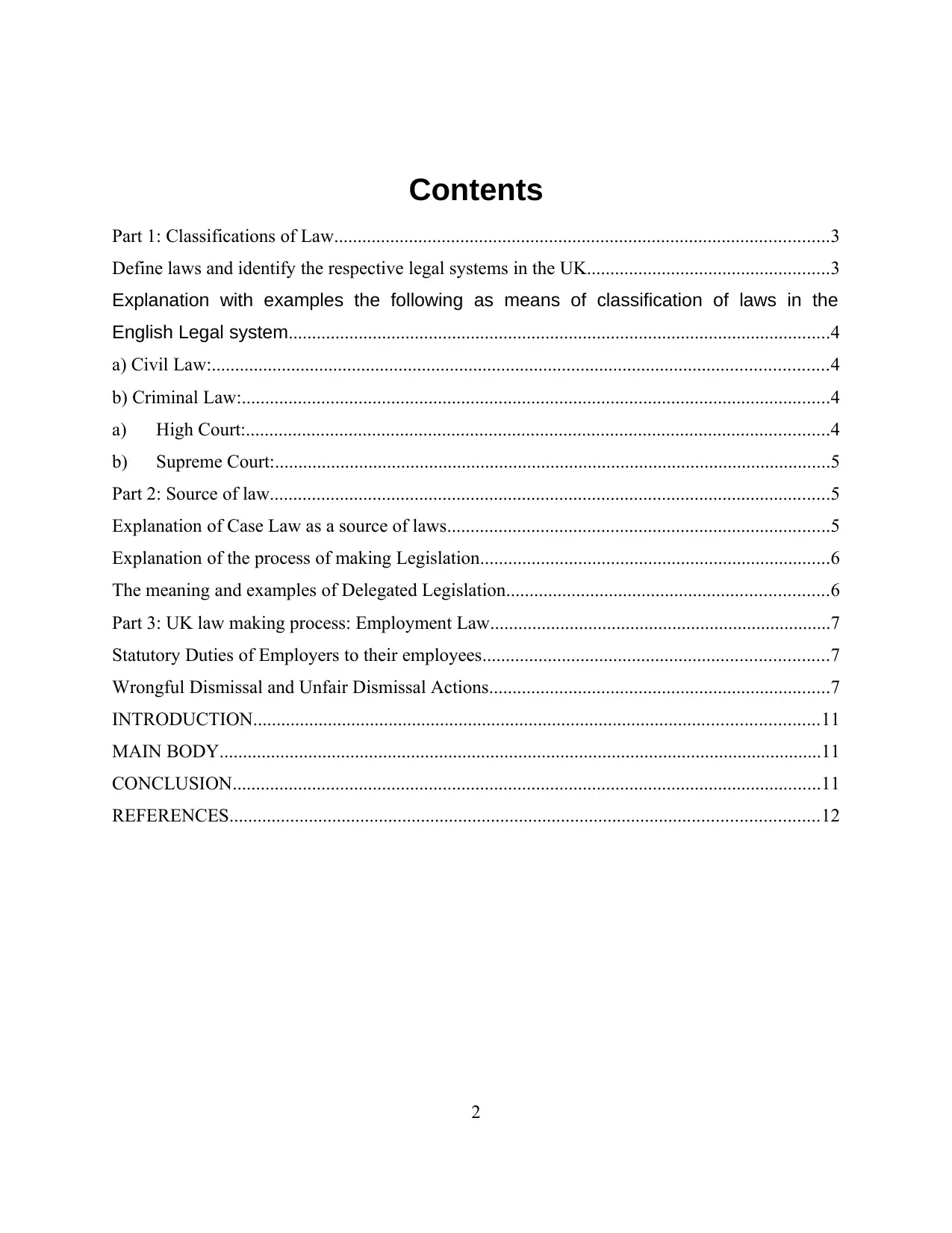
Contents
Part 1: Classifications of Law..........................................................................................................3
Define laws and identify the respective legal systems in the UK....................................................3
Explanation with examples the following as means of classification of laws in the
English Legal system....................................................................................................................4
a) Civil Law:....................................................................................................................................4
b) Criminal Law:..............................................................................................................................4
a) High Court:.............................................................................................................................4
b) Supreme Court:.......................................................................................................................5
Part 2: Source of law........................................................................................................................5
Explanation of Case Law as a source of laws..................................................................................5
Explanation of the process of making Legislation...........................................................................6
The meaning and examples of Delegated Legislation.....................................................................6
Part 3: UK law making process: Employment Law.........................................................................7
Statutory Duties of Employers to their employees..........................................................................7
Wrongful Dismissal and Unfair Dismissal Actions.........................................................................7
INTRODUCTION.........................................................................................................................11
MAIN BODY.................................................................................................................................11
CONCLUSION..............................................................................................................................11
REFERENCES..............................................................................................................................12
2
Part 1: Classifications of Law..........................................................................................................3
Define laws and identify the respective legal systems in the UK....................................................3
Explanation with examples the following as means of classification of laws in the
English Legal system....................................................................................................................4
a) Civil Law:....................................................................................................................................4
b) Criminal Law:..............................................................................................................................4
a) High Court:.............................................................................................................................4
b) Supreme Court:.......................................................................................................................5
Part 2: Source of law........................................................................................................................5
Explanation of Case Law as a source of laws..................................................................................5
Explanation of the process of making Legislation...........................................................................6
The meaning and examples of Delegated Legislation.....................................................................6
Part 3: UK law making process: Employment Law.........................................................................7
Statutory Duties of Employers to their employees..........................................................................7
Wrongful Dismissal and Unfair Dismissal Actions.........................................................................7
INTRODUCTION.........................................................................................................................11
MAIN BODY.................................................................................................................................11
CONCLUSION..............................................................................................................................11
REFERENCES..............................................................................................................................12
2
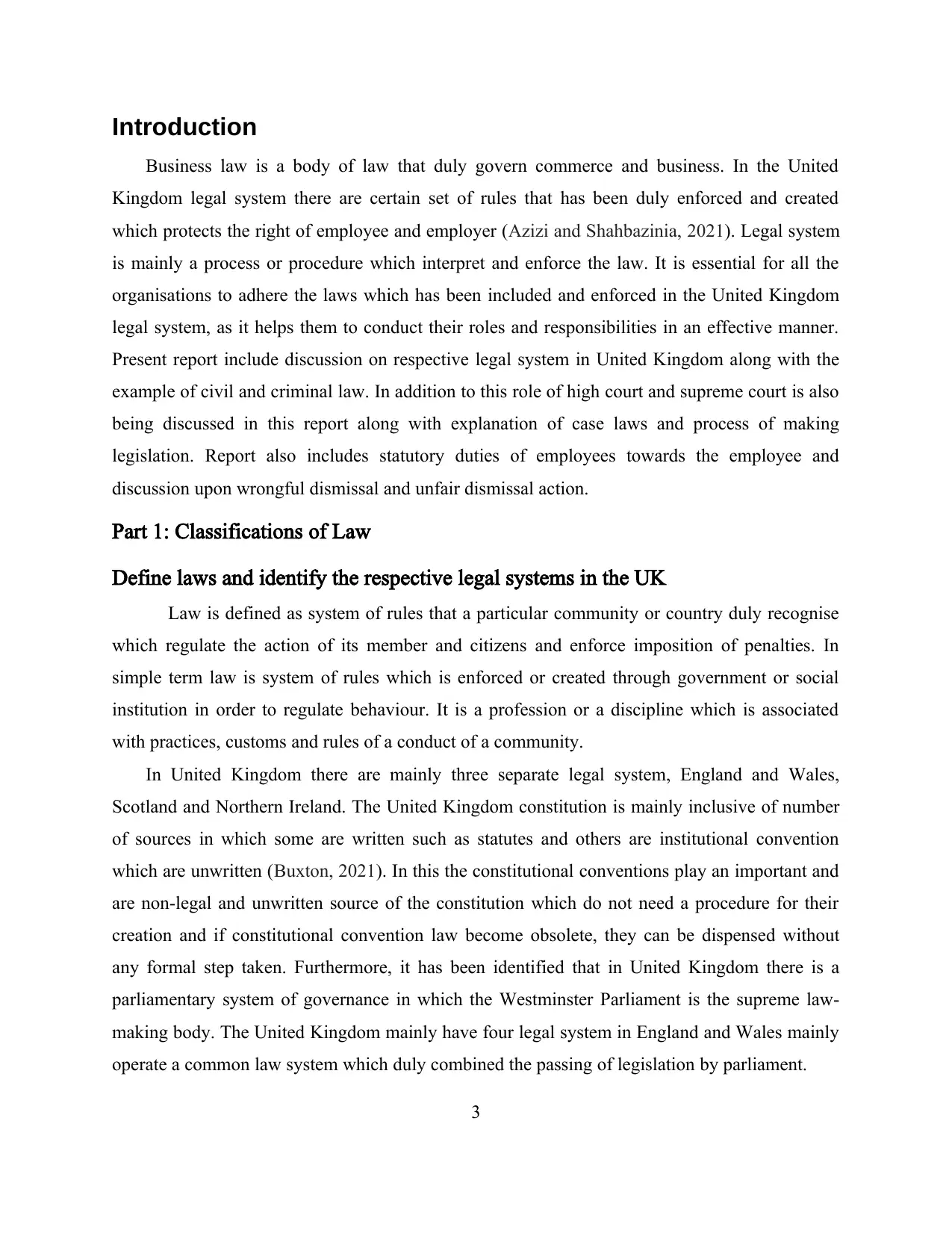
Introduction
Business law is a body of law that duly govern commerce and business. In the United
Kingdom legal system there are certain set of rules that has been duly enforced and created
which protects the right of employee and employer (Azizi and Shahbazinia, 2021). Legal system
is mainly a process or procedure which interpret and enforce the law. It is essential for all the
organisations to adhere the laws which has been included and enforced in the United Kingdom
legal system, as it helps them to conduct their roles and responsibilities in an effective manner.
Present report include discussion on respective legal system in United Kingdom along with the
example of civil and criminal law. In addition to this role of high court and supreme court is also
being discussed in this report along with explanation of case laws and process of making
legislation. Report also includes statutory duties of employees towards the employee and
discussion upon wrongful dismissal and unfair dismissal action.
Part 1: Classifications of Law
Define laws and identify the respective legal systems in the UK
Law is defined as system of rules that a particular community or country duly recognise
which regulate the action of its member and citizens and enforce imposition of penalties. In
simple term law is system of rules which is enforced or created through government or social
institution in order to regulate behaviour. It is a profession or a discipline which is associated
with practices, customs and rules of a conduct of a community.
In United Kingdom there are mainly three separate legal system, England and Wales,
Scotland and Northern Ireland. The United Kingdom constitution is mainly inclusive of number
of sources in which some are written such as statutes and others are institutional convention
which are unwritten (Buxton, 2021). In this the constitutional conventions play an important and
are non-legal and unwritten source of the constitution which do not need a procedure for their
creation and if constitutional convention law become obsolete, they can be dispensed without
any formal step taken. Furthermore, it has been identified that in United Kingdom there is a
parliamentary system of governance in which the Westminster Parliament is the supreme law-
making body. The United Kingdom mainly have four legal system in England and Wales mainly
operate a common law system which duly combined the passing of legislation by parliament.
3
Business law is a body of law that duly govern commerce and business. In the United
Kingdom legal system there are certain set of rules that has been duly enforced and created
which protects the right of employee and employer (Azizi and Shahbazinia, 2021). Legal system
is mainly a process or procedure which interpret and enforce the law. It is essential for all the
organisations to adhere the laws which has been included and enforced in the United Kingdom
legal system, as it helps them to conduct their roles and responsibilities in an effective manner.
Present report include discussion on respective legal system in United Kingdom along with the
example of civil and criminal law. In addition to this role of high court and supreme court is also
being discussed in this report along with explanation of case laws and process of making
legislation. Report also includes statutory duties of employees towards the employee and
discussion upon wrongful dismissal and unfair dismissal action.
Part 1: Classifications of Law
Define laws and identify the respective legal systems in the UK
Law is defined as system of rules that a particular community or country duly recognise
which regulate the action of its member and citizens and enforce imposition of penalties. In
simple term law is system of rules which is enforced or created through government or social
institution in order to regulate behaviour. It is a profession or a discipline which is associated
with practices, customs and rules of a conduct of a community.
In United Kingdom there are mainly three separate legal system, England and Wales,
Scotland and Northern Ireland. The United Kingdom constitution is mainly inclusive of number
of sources in which some are written such as statutes and others are institutional convention
which are unwritten (Buxton, 2021). In this the constitutional conventions play an important and
are non-legal and unwritten source of the constitution which do not need a procedure for their
creation and if constitutional convention law become obsolete, they can be dispensed without
any formal step taken. Furthermore, it has been identified that in United Kingdom there is a
parliamentary system of governance in which the Westminster Parliament is the supreme law-
making body. The United Kingdom mainly have four legal system in England and Wales mainly
operate a common law system which duly combined the passing of legislation by parliament.
3
⊘ This is a preview!⊘
Do you want full access?
Subscribe today to unlock all pages.

Trusted by 1+ million students worldwide
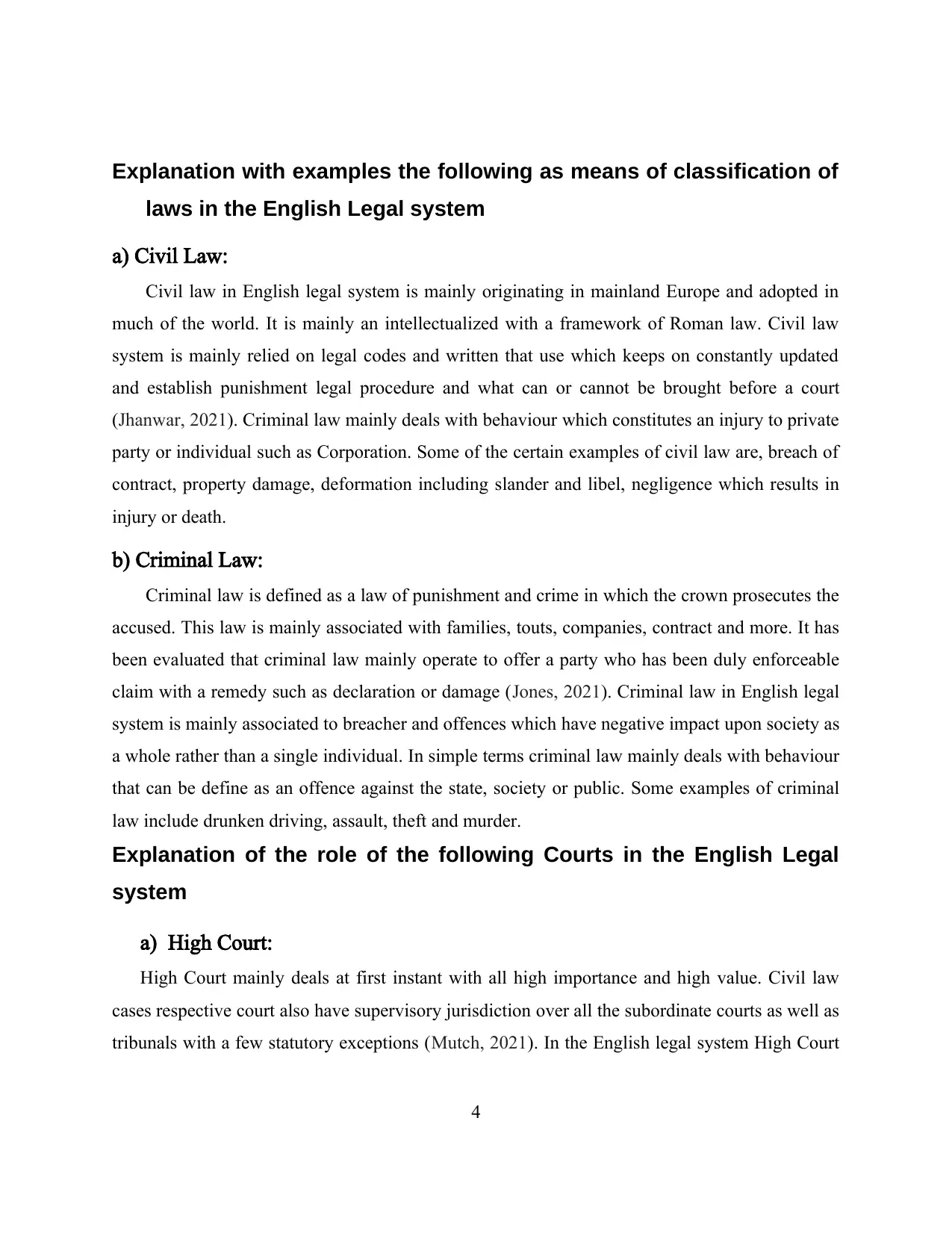
Explanation with examples the following as means of classification of
laws in the English Legal system
a) Civil Law:
Civil law in English legal system is mainly originating in mainland Europe and adopted in
much of the world. It is mainly an intellectualized with a framework of Roman law. Civil law
system is mainly relied on legal codes and written that use which keeps on constantly updated
and establish punishment legal procedure and what can or cannot be brought before a court
(Jhanwar, 2021). Criminal law mainly deals with behaviour which constitutes an injury to private
party or individual such as Corporation. Some of the certain examples of civil law are, breach of
contract, property damage, deformation including slander and libel, negligence which results in
injury or death.
b) Criminal Law:
Criminal law is defined as a law of punishment and crime in which the crown prosecutes the
accused. This law is mainly associated with families, touts, companies, contract and more. It has
been evaluated that criminal law mainly operate to offer a party who has been duly enforceable
claim with a remedy such as declaration or damage (Jones, 2021). Criminal law in English legal
system is mainly associated to breacher and offences which have negative impact upon society as
a whole rather than a single individual. In simple terms criminal law mainly deals with behaviour
that can be define as an offence against the state, society or public. Some examples of criminal
law include drunken driving, assault, theft and murder.
Explanation of the role of the following Courts in the English Legal
system
a) High Court:
High Court mainly deals at first instant with all high importance and high value. Civil law
cases respective court also have supervisory jurisdiction over all the subordinate courts as well as
tribunals with a few statutory exceptions (Mutch, 2021). In the English legal system High Court
4
laws in the English Legal system
a) Civil Law:
Civil law in English legal system is mainly originating in mainland Europe and adopted in
much of the world. It is mainly an intellectualized with a framework of Roman law. Civil law
system is mainly relied on legal codes and written that use which keeps on constantly updated
and establish punishment legal procedure and what can or cannot be brought before a court
(Jhanwar, 2021). Criminal law mainly deals with behaviour which constitutes an injury to private
party or individual such as Corporation. Some of the certain examples of civil law are, breach of
contract, property damage, deformation including slander and libel, negligence which results in
injury or death.
b) Criminal Law:
Criminal law is defined as a law of punishment and crime in which the crown prosecutes the
accused. This law is mainly associated with families, touts, companies, contract and more. It has
been evaluated that criminal law mainly operate to offer a party who has been duly enforceable
claim with a remedy such as declaration or damage (Jones, 2021). Criminal law in English legal
system is mainly associated to breacher and offences which have negative impact upon society as
a whole rather than a single individual. In simple terms criminal law mainly deals with behaviour
that can be define as an offence against the state, society or public. Some examples of criminal
law include drunken driving, assault, theft and murder.
Explanation of the role of the following Courts in the English Legal
system
a) High Court:
High Court mainly deals at first instant with all high importance and high value. Civil law
cases respective court also have supervisory jurisdiction over all the subordinate courts as well as
tribunals with a few statutory exceptions (Mutch, 2021). In the English legal system High Court
4
Paraphrase This Document
Need a fresh take? Get an instant paraphrase of this document with our AI Paraphraser
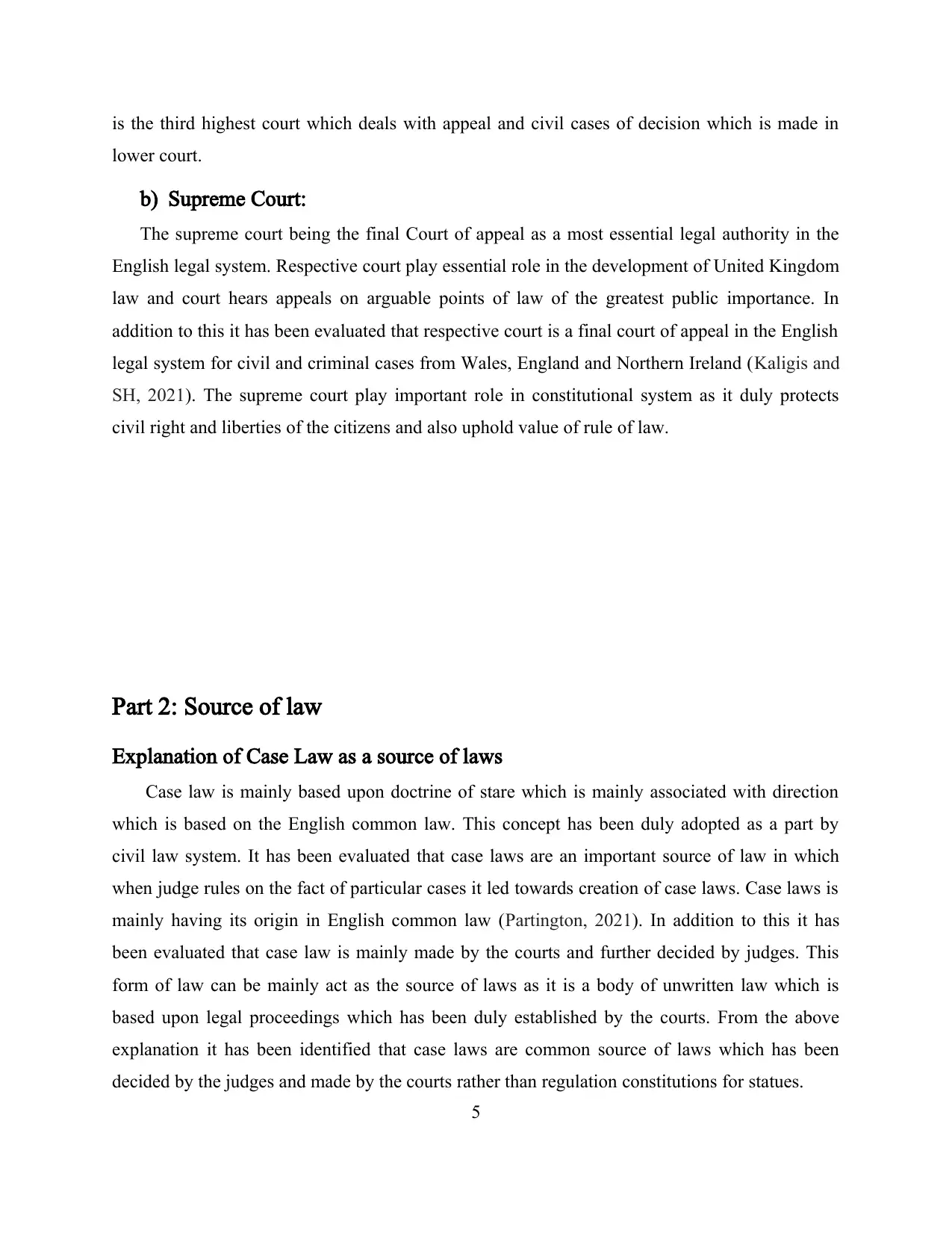
is the third highest court which deals with appeal and civil cases of decision which is made in
lower court.
b) Supreme Court:
The supreme court being the final Court of appeal as a most essential legal authority in the
English legal system. Respective court play essential role in the development of United Kingdom
law and court hears appeals on arguable points of law of the greatest public importance. In
addition to this it has been evaluated that respective court is a final court of appeal in the English
legal system for civil and criminal cases from Wales, England and Northern Ireland (Kaligis and
SH, 2021). The supreme court play important role in constitutional system as it duly protects
civil right and liberties of the citizens and also uphold value of rule of law.
Part 2: Source of law
Explanation of Case Law as a source of laws
Case law is mainly based upon doctrine of stare which is mainly associated with direction
which is based on the English common law. This concept has been duly adopted as a part by
civil law system. It has been evaluated that case laws are an important source of law in which
when judge rules on the fact of particular cases it led towards creation of case laws. Case laws is
mainly having its origin in English common law (Partington, 2021). In addition to this it has
been evaluated that case law is mainly made by the courts and further decided by judges. This
form of law can be mainly act as the source of laws as it is a body of unwritten law which is
based upon legal proceedings which has been duly established by the courts. From the above
explanation it has been identified that case laws are common source of laws which has been
decided by the judges and made by the courts rather than regulation constitutions for statues.
5
lower court.
b) Supreme Court:
The supreme court being the final Court of appeal as a most essential legal authority in the
English legal system. Respective court play essential role in the development of United Kingdom
law and court hears appeals on arguable points of law of the greatest public importance. In
addition to this it has been evaluated that respective court is a final court of appeal in the English
legal system for civil and criminal cases from Wales, England and Northern Ireland (Kaligis and
SH, 2021). The supreme court play important role in constitutional system as it duly protects
civil right and liberties of the citizens and also uphold value of rule of law.
Part 2: Source of law
Explanation of Case Law as a source of laws
Case law is mainly based upon doctrine of stare which is mainly associated with direction
which is based on the English common law. This concept has been duly adopted as a part by
civil law system. It has been evaluated that case laws are an important source of law in which
when judge rules on the fact of particular cases it led towards creation of case laws. Case laws is
mainly having its origin in English common law (Partington, 2021). In addition to this it has
been evaluated that case law is mainly made by the courts and further decided by judges. This
form of law can be mainly act as the source of laws as it is a body of unwritten law which is
based upon legal proceedings which has been duly established by the courts. From the above
explanation it has been identified that case laws are common source of laws which has been
decided by the judges and made by the courts rather than regulation constitutions for statues.
5
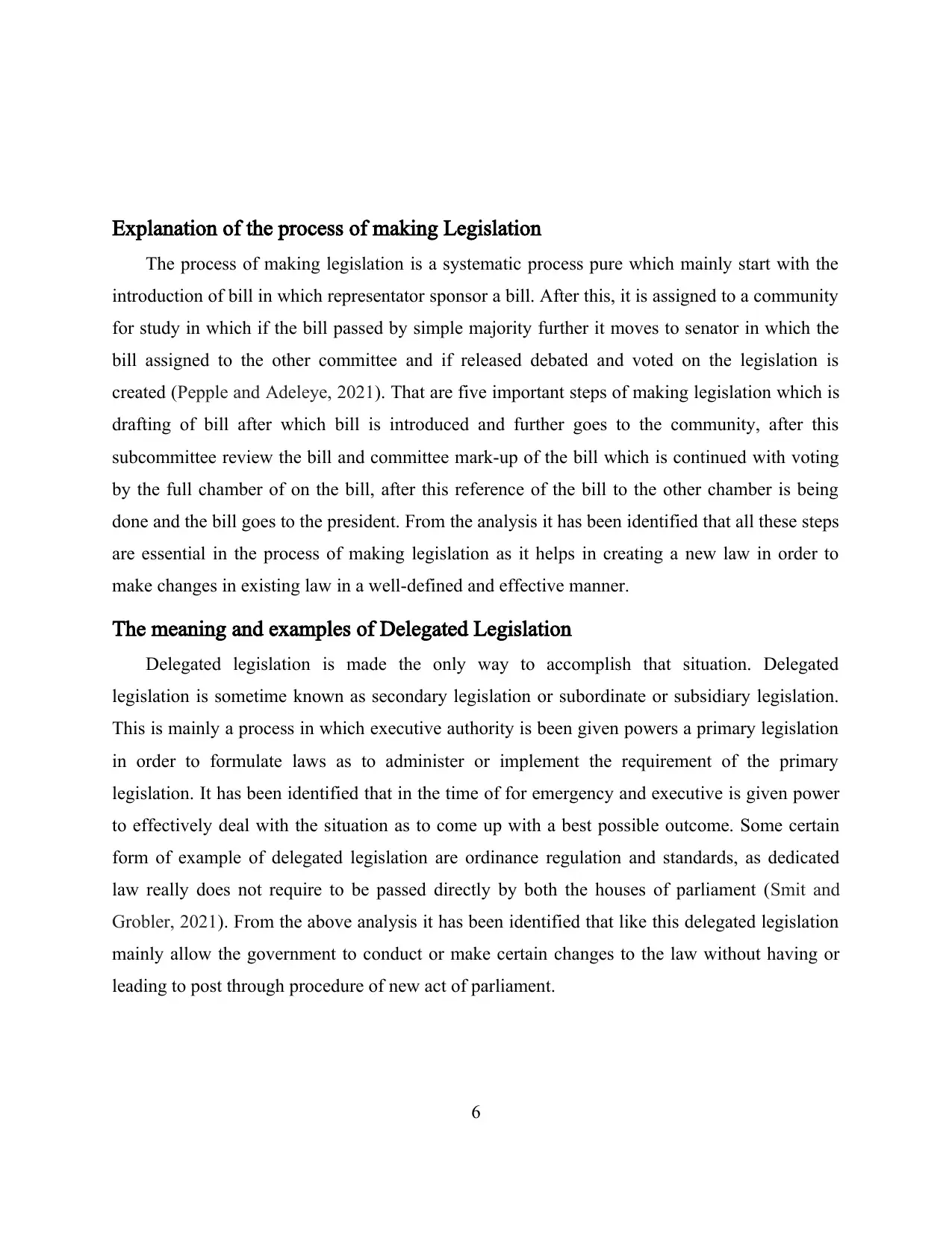
Explanation of the process of making Legislation
The process of making legislation is a systematic process pure which mainly start with the
introduction of bill in which representator sponsor a bill. After this, it is assigned to a community
for study in which if the bill passed by simple majority further it moves to senator in which the
bill assigned to the other committee and if released debated and voted on the legislation is
created (Pepple and Adeleye, 2021). That are five important steps of making legislation which is
drafting of bill after which bill is introduced and further goes to the community, after this
subcommittee review the bill and committee mark-up of the bill which is continued with voting
by the full chamber of on the bill, after this reference of the bill to the other chamber is being
done and the bill goes to the president. From the analysis it has been identified that all these steps
are essential in the process of making legislation as it helps in creating a new law in order to
make changes in existing law in a well-defined and effective manner.
The meaning and examples of Delegated Legislation
Delegated legislation is made the only way to accomplish that situation. Delegated
legislation is sometime known as secondary legislation or subordinate or subsidiary legislation.
This is mainly a process in which executive authority is been given powers a primary legislation
in order to formulate laws as to administer or implement the requirement of the primary
legislation. It has been identified that in the time of for emergency and executive is given power
to effectively deal with the situation as to come up with a best possible outcome. Some certain
form of example of delegated legislation are ordinance regulation and standards, as dedicated
law really does not require to be passed directly by both the houses of parliament (Smit and
Grobler, 2021). From the above analysis it has been identified that like this delegated legislation
mainly allow the government to conduct or make certain changes to the law without having or
leading to post through procedure of new act of parliament.
6
The process of making legislation is a systematic process pure which mainly start with the
introduction of bill in which representator sponsor a bill. After this, it is assigned to a community
for study in which if the bill passed by simple majority further it moves to senator in which the
bill assigned to the other committee and if released debated and voted on the legislation is
created (Pepple and Adeleye, 2021). That are five important steps of making legislation which is
drafting of bill after which bill is introduced and further goes to the community, after this
subcommittee review the bill and committee mark-up of the bill which is continued with voting
by the full chamber of on the bill, after this reference of the bill to the other chamber is being
done and the bill goes to the president. From the analysis it has been identified that all these steps
are essential in the process of making legislation as it helps in creating a new law in order to
make changes in existing law in a well-defined and effective manner.
The meaning and examples of Delegated Legislation
Delegated legislation is made the only way to accomplish that situation. Delegated
legislation is sometime known as secondary legislation or subordinate or subsidiary legislation.
This is mainly a process in which executive authority is been given powers a primary legislation
in order to formulate laws as to administer or implement the requirement of the primary
legislation. It has been identified that in the time of for emergency and executive is given power
to effectively deal with the situation as to come up with a best possible outcome. Some certain
form of example of delegated legislation are ordinance regulation and standards, as dedicated
law really does not require to be passed directly by both the houses of parliament (Smit and
Grobler, 2021). From the above analysis it has been identified that like this delegated legislation
mainly allow the government to conduct or make certain changes to the law without having or
leading to post through procedure of new act of parliament.
6
⊘ This is a preview!⊘
Do you want full access?
Subscribe today to unlock all pages.

Trusted by 1+ million students worldwide
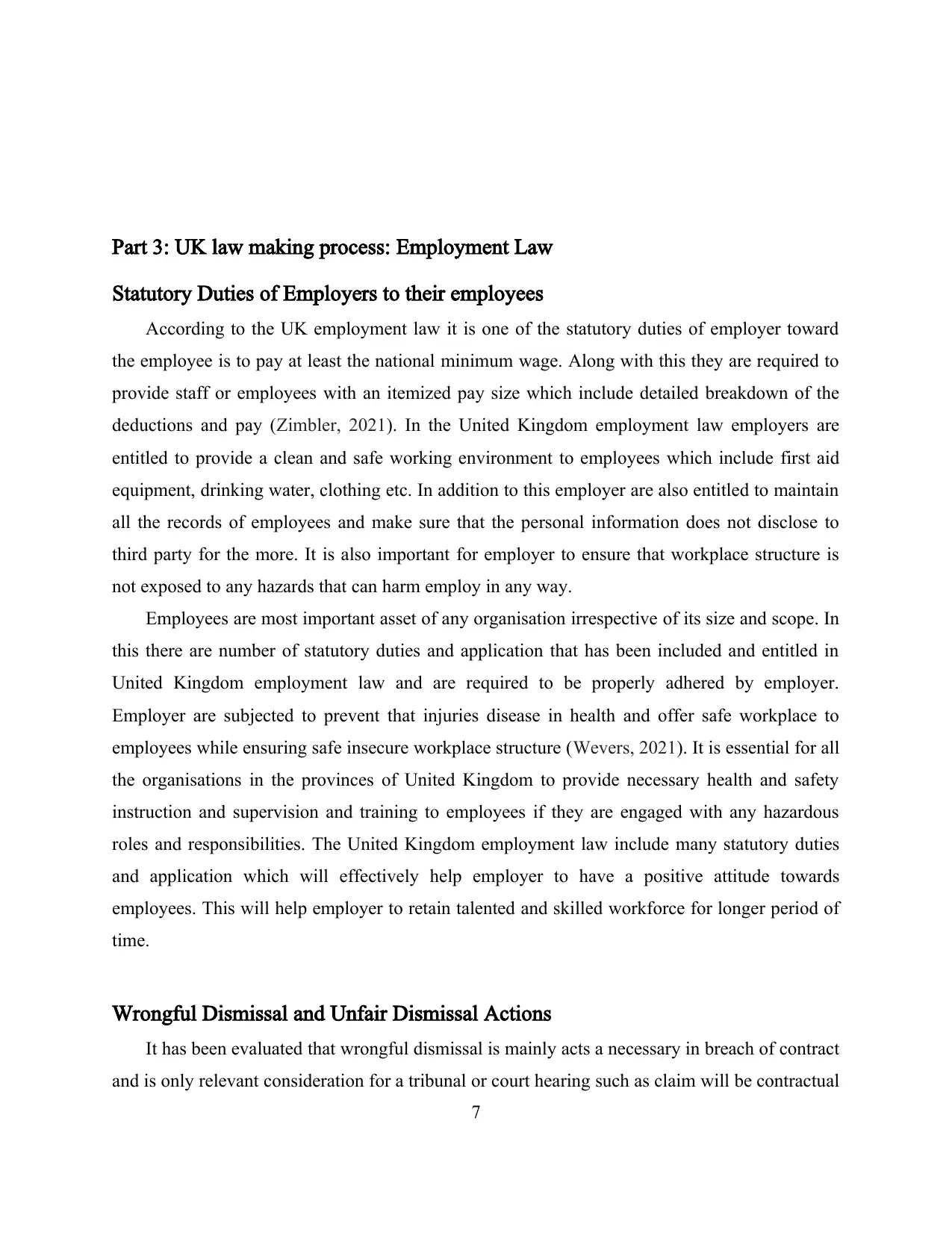
Part 3: UK law making process: Employment Law
Statutory Duties of Employers to their employees
According to the UK employment law it is one of the statutory duties of employer toward
the employee is to pay at least the national minimum wage. Along with this they are required to
provide staff or employees with an itemized pay size which include detailed breakdown of the
deductions and pay (Zimbler, 2021). In the United Kingdom employment law employers are
entitled to provide a clean and safe working environment to employees which include first aid
equipment, drinking water, clothing etc. In addition to this employer are also entitled to maintain
all the records of employees and make sure that the personal information does not disclose to
third party for the more. It is also important for employer to ensure that workplace structure is
not exposed to any hazards that can harm employ in any way.
Employees are most important asset of any organisation irrespective of its size and scope. In
this there are number of statutory duties and application that has been included and entitled in
United Kingdom employment law and are required to be properly adhered by employer.
Employer are subjected to prevent that injuries disease in health and offer safe workplace to
employees while ensuring safe insecure workplace structure (Wevers, 2021). It is essential for all
the organisations in the provinces of United Kingdom to provide necessary health and safety
instruction and supervision and training to employees if they are engaged with any hazardous
roles and responsibilities. The United Kingdom employment law include many statutory duties
and application which will effectively help employer to have a positive attitude towards
employees. This will help employer to retain talented and skilled workforce for longer period of
time.
Wrongful Dismissal and Unfair Dismissal Actions
It has been evaluated that wrongful dismissal is mainly acts a necessary in breach of contract
and is only relevant consideration for a tribunal or court hearing such as claim will be contractual
7
Statutory Duties of Employers to their employees
According to the UK employment law it is one of the statutory duties of employer toward
the employee is to pay at least the national minimum wage. Along with this they are required to
provide staff or employees with an itemized pay size which include detailed breakdown of the
deductions and pay (Zimbler, 2021). In the United Kingdom employment law employers are
entitled to provide a clean and safe working environment to employees which include first aid
equipment, drinking water, clothing etc. In addition to this employer are also entitled to maintain
all the records of employees and make sure that the personal information does not disclose to
third party for the more. It is also important for employer to ensure that workplace structure is
not exposed to any hazards that can harm employ in any way.
Employees are most important asset of any organisation irrespective of its size and scope. In
this there are number of statutory duties and application that has been included and entitled in
United Kingdom employment law and are required to be properly adhered by employer.
Employer are subjected to prevent that injuries disease in health and offer safe workplace to
employees while ensuring safe insecure workplace structure (Wevers, 2021). It is essential for all
the organisations in the provinces of United Kingdom to provide necessary health and safety
instruction and supervision and training to employees if they are engaged with any hazardous
roles and responsibilities. The United Kingdom employment law include many statutory duties
and application which will effectively help employer to have a positive attitude towards
employees. This will help employer to retain talented and skilled workforce for longer period of
time.
Wrongful Dismissal and Unfair Dismissal Actions
It has been evaluated that wrongful dismissal is mainly acts a necessary in breach of contract
and is only relevant consideration for a tribunal or court hearing such as claim will be contractual
7
Paraphrase This Document
Need a fresh take? Get an instant paraphrase of this document with our AI Paraphraser
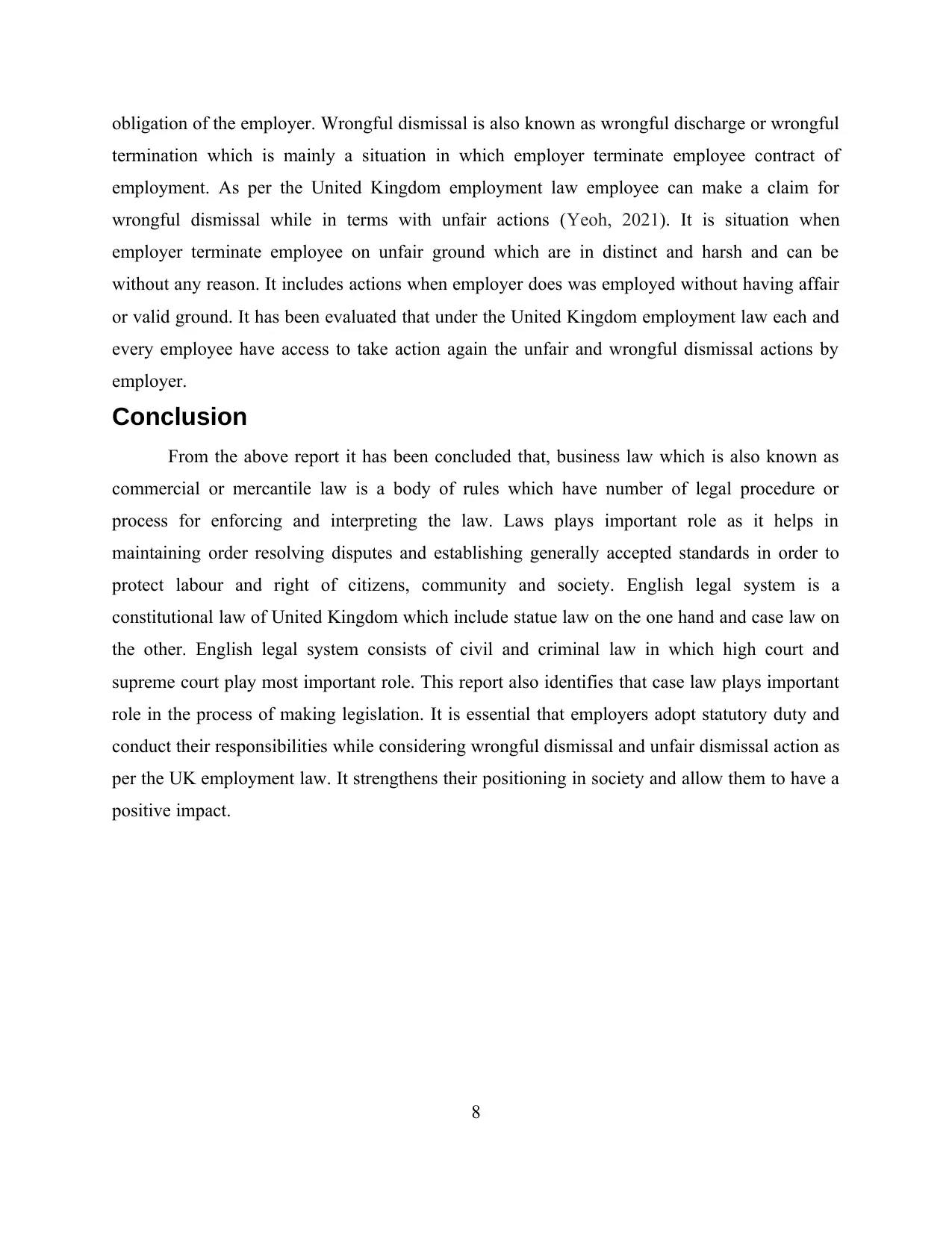
obligation of the employer. Wrongful dismissal is also known as wrongful discharge or wrongful
termination which is mainly a situation in which employer terminate employee contract of
employment. As per the United Kingdom employment law employee can make a claim for
wrongful dismissal while in terms with unfair actions (Yeoh, 2021). It is situation when
employer terminate employee on unfair ground which are in distinct and harsh and can be
without any reason. It includes actions when employer does was employed without having affair
or valid ground. It has been evaluated that under the United Kingdom employment law each and
every employee have access to take action again the unfair and wrongful dismissal actions by
employer.
Conclusion
From the above report it has been concluded that, business law which is also known as
commercial or mercantile law is a body of rules which have number of legal procedure or
process for enforcing and interpreting the law. Laws plays important role as it helps in
maintaining order resolving disputes and establishing generally accepted standards in order to
protect labour and right of citizens, community and society. English legal system is a
constitutional law of United Kingdom which include statue law on the one hand and case law on
the other. English legal system consists of civil and criminal law in which high court and
supreme court play most important role. This report also identifies that case law plays important
role in the process of making legislation. It is essential that employers adopt statutory duty and
conduct their responsibilities while considering wrongful dismissal and unfair dismissal action as
per the UK employment law. It strengthens their positioning in society and allow them to have a
positive impact.
8
termination which is mainly a situation in which employer terminate employee contract of
employment. As per the United Kingdom employment law employee can make a claim for
wrongful dismissal while in terms with unfair actions (Yeoh, 2021). It is situation when
employer terminate employee on unfair ground which are in distinct and harsh and can be
without any reason. It includes actions when employer does was employed without having affair
or valid ground. It has been evaluated that under the United Kingdom employment law each and
every employee have access to take action again the unfair and wrongful dismissal actions by
employer.
Conclusion
From the above report it has been concluded that, business law which is also known as
commercial or mercantile law is a body of rules which have number of legal procedure or
process for enforcing and interpreting the law. Laws plays important role as it helps in
maintaining order resolving disputes and establishing generally accepted standards in order to
protect labour and right of citizens, community and society. English legal system is a
constitutional law of United Kingdom which include statue law on the one hand and case law on
the other. English legal system consists of civil and criminal law in which high court and
supreme court play most important role. This report also identifies that case law plays important
role in the process of making legislation. It is essential that employers adopt statutory duty and
conduct their responsibilities while considering wrongful dismissal and unfair dismissal action as
per the UK employment law. It strengthens their positioning in society and allow them to have a
positive impact.
8
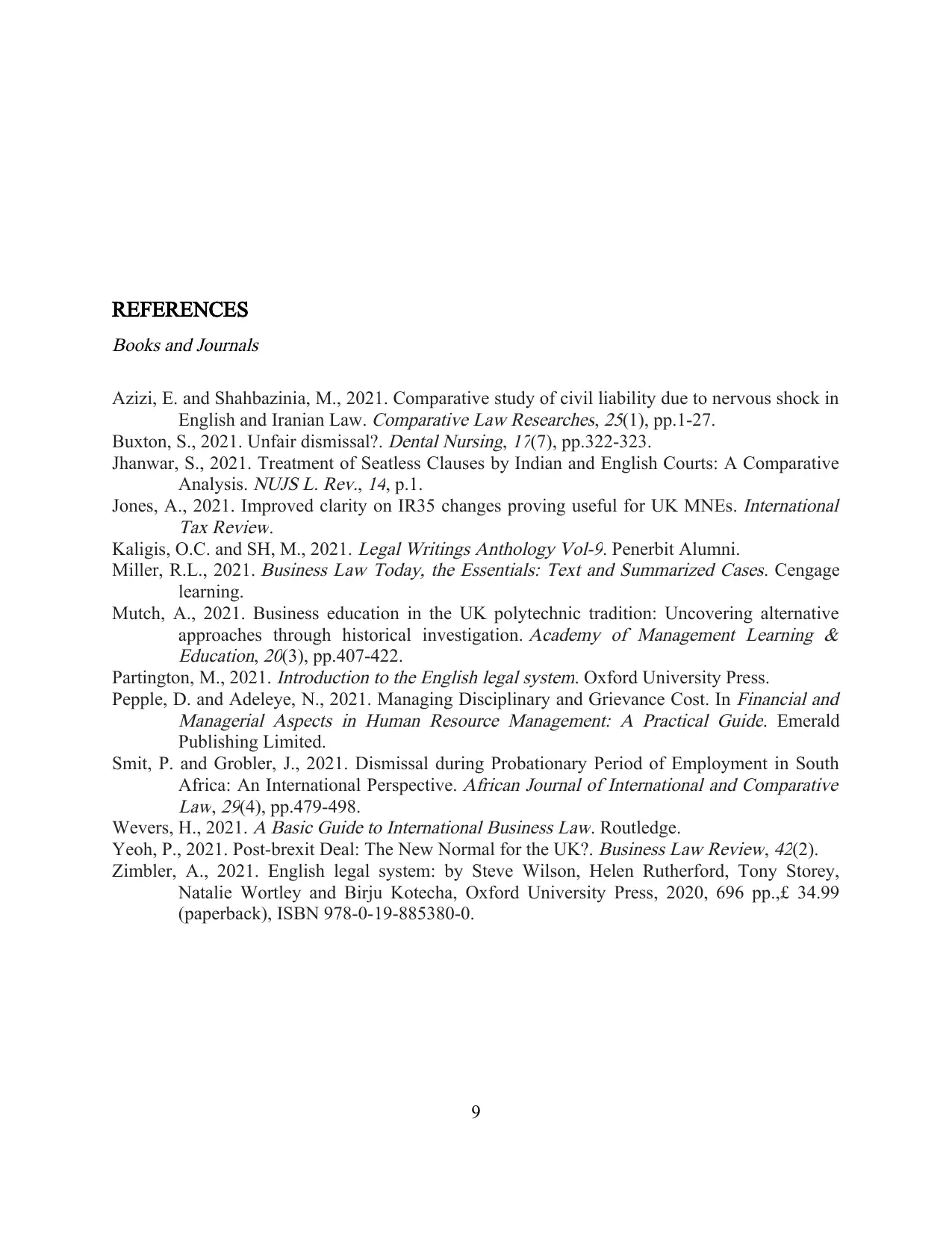
REFERENCESBooks and Journals
Azizi, E. and Shahbazinia, M., 2021. Comparative study of civil liability due to nervous shock in
English and Iranian Law.
Comparative Law Researches,
25(1), pp.1-27.
Buxton, S., 2021. Unfair dismissal?.
Dental Nursing,
17(7), pp.322-323.
Jhanwar, S., 2021. Treatment of Seatless Clauses by Indian and English Courts: A Comparative
Analysis.
NUJS L. Rev.,
14, p.1.
Jones, A., 2021. Improved clarity on IR35 changes proving useful for UK MNEs.
International
Tax Review.
Kaligis, O.C. and SH, M., 2021.
Legal Writings Anthology Vol-9. Penerbit Alumni.
Miller, R.L., 2021.
Business Law Today, the Essentials: Text and Summarized Cases. Cengage
learning.
Mutch, A., 2021. Business education in the UK polytechnic tradition: Uncovering alternative
approaches through historical investigation.
Academy of Management Learning &
Education,
20(3), pp.407-422.
Partington, M., 2021.
Introduction to the English legal system. Oxford University Press.
Pepple, D. and Adeleye, N., 2021. Managing Disciplinary and Grievance Cost. In
Financial and
Managerial Aspects in Human Resource Management: A Practical Guide. Emerald
Publishing Limited.
Smit, P. and Grobler, J., 2021. Dismissal during Probationary Period of Employment in South
Africa: An International Perspective.
African Journal of International and Comparative
Law,
29(4), pp.479-498.
Wevers, H., 2021.
A Basic Guide to International Business Law. Routledge.
Yeoh, P., 2021. Post-brexit Deal: The New Normal for the UK?.
Business Law Review,
42(2).
Zimbler, A., 2021. English legal system: by Steve Wilson, Helen Rutherford, Tony Storey,
Natalie Wortley and Birju Kotecha, Oxford University Press, 2020, 696 pp.,£ 34.99
(paperback), ISBN 978-0-19-885380-0.
9
Azizi, E. and Shahbazinia, M., 2021. Comparative study of civil liability due to nervous shock in
English and Iranian Law.
Comparative Law Researches,
25(1), pp.1-27.
Buxton, S., 2021. Unfair dismissal?.
Dental Nursing,
17(7), pp.322-323.
Jhanwar, S., 2021. Treatment of Seatless Clauses by Indian and English Courts: A Comparative
Analysis.
NUJS L. Rev.,
14, p.1.
Jones, A., 2021. Improved clarity on IR35 changes proving useful for UK MNEs.
International
Tax Review.
Kaligis, O.C. and SH, M., 2021.
Legal Writings Anthology Vol-9. Penerbit Alumni.
Miller, R.L., 2021.
Business Law Today, the Essentials: Text and Summarized Cases. Cengage
learning.
Mutch, A., 2021. Business education in the UK polytechnic tradition: Uncovering alternative
approaches through historical investigation.
Academy of Management Learning &
Education,
20(3), pp.407-422.
Partington, M., 2021.
Introduction to the English legal system. Oxford University Press.
Pepple, D. and Adeleye, N., 2021. Managing Disciplinary and Grievance Cost. In
Financial and
Managerial Aspects in Human Resource Management: A Practical Guide. Emerald
Publishing Limited.
Smit, P. and Grobler, J., 2021. Dismissal during Probationary Period of Employment in South
Africa: An International Perspective.
African Journal of International and Comparative
Law,
29(4), pp.479-498.
Wevers, H., 2021.
A Basic Guide to International Business Law. Routledge.
Yeoh, P., 2021. Post-brexit Deal: The New Normal for the UK?.
Business Law Review,
42(2).
Zimbler, A., 2021. English legal system: by Steve Wilson, Helen Rutherford, Tony Storey,
Natalie Wortley and Birju Kotecha, Oxford University Press, 2020, 696 pp.,£ 34.99
(paperback), ISBN 978-0-19-885380-0.
9
⊘ This is a preview!⊘
Do you want full access?
Subscribe today to unlock all pages.

Trusted by 1+ million students worldwide

10
Paraphrase This Document
Need a fresh take? Get an instant paraphrase of this document with our AI Paraphraser

11
1 out of 11
Related Documents
Your All-in-One AI-Powered Toolkit for Academic Success.
+13062052269
info@desklib.com
Available 24*7 on WhatsApp / Email
![[object Object]](/_next/static/media/star-bottom.7253800d.svg)
Unlock your academic potential
Copyright © 2020–2026 A2Z Services. All Rights Reserved. Developed and managed by ZUCOL.


